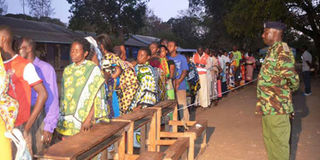Breaking News: CDF Francis Ogolla involved in KDF chopper crash
Time to interrogate narrative about voting on ethnic lines

Residents of Ganda in Kilifi queue to vote at Maziwani Primary School in the Malindi parliamentary by-election on March 7, 2016. PHOTO | KAZUNGU SAMUEL | NATION MEDIA GROUP
What you need to know:
- Our national elections have become a cutthroat intra-ethnic competition for resources that polarises the country and sows ethnic conflict.
- As we get fully into yet another election campaign period, it is time to interrogate and put to rest the narrative that it is important to vote for a fellow tribesman to attain socioeconomic development, given its strong influence on our national discourse.
One of the constantly abused and much used lines to woo ethnic support during elections is the seductive argument that it is important to vote for a fellow tribesman to attain socioeconomic development. Due to this often-repeated line, our national elections have become a cutthroat intra-ethnic competition for resources that polarises the country and sows ethnic conflict. As we get fully into yet another election campaign period, it is time to interrogate and put to rest this narrative, given its strong influence on our national discourse.
According to a recent analysis of the 2017 election agendas by a Nation team, the positive correlation between the presidency and the prosperity of a community was established during the regime of founding President Jomo Kenyatta. According to the report, due to the partiality shown by the first president towards his own Kikuyu community, and especially to the people from his Kiambu home turf, the idea that capturing the presidency is the fastest lane to ethnic prosperity was formed. Since the subsequent regimes emulated the first president, the idea that a community’s prosperity depends on capturing leadership became entrenched. It is this that prompted some politicians to even propose a change in the Constitution to create a rotational presidency. But what, if any are the merits of this popular assertion? In a 2014 National Cohesion and Integration Commission report on the status of social cohesion in the country, Kiambu residents scored the highest in the social cohesion index, which measures a community’s predisposition towards the government.
MOST COHESIVE
According to the report, Kiambu residents were judged to be the most cohesive because successive regimes have built first-rate social amenities and infrastructure that make the residents well-disposed towards the government. Apart from the social capital, other factors that contribute to the residents’ positive disposition towards the leadership is a thriving agrarian economy due to good weather and a nascent real estate industry that feeds from the area’s proximity to Nairobi. Considering that Kiambu has produced half of the presidents since independence, the results seem to confirm the positive correlation between the presidency and the prosperity of a community. The consistency of this argument, however, flounders when you apply it to Baringo, which is the other region that has produced a president. For, although the second president is a native of Baringo, it is level of poverty is so profound that many of its people die of starvation whenever drought sets in. The deleterious effects of unfavourable weather conditions are, however, not just restricted to Baringo but are evident in all desert and semi-desert regions, suggesting that the presidency is not the only factor that influences the wealth of a community.
NO INFLUENCE
What this evidence shows is that while political power can skew resources in favour of a community, other variables such as climate, geography, natural resources and security, are important and do influence the prosperity. The narrative that a community has to capture the presidency in order to prosper is, therefore, not only misleading but can also be harmful. What the evidence also shows is that any community can be as prosperous as the people of Kiambu if it had the advantage of the proximity to the capital city as well as a favourable climate. An equally important reason for challenging the narrative is what it says about our conception of the role of the individual in wealth creation. The belief that the prosperity of a community depends on getting one of their own in a position to channel resources in their favour is based on an ideology that believes that individuals are hapless wards of the State and the government is a benefactor.
It is for this reason that Kenyans only talk of sharing the national cake and never about how to bake it. This also explains how ethnic politics revolves around how to share the national cake. The people are, however, not just slaves of the State, but free individuals capable of producing wealth through their sheer efforts and self-motivation. This is the underlying philosophy of free market economies and the ideological standard we must aspire to in order to rise above our divisive ethnic narrative.
Githeiya Kimari is an economic and political analyst.




